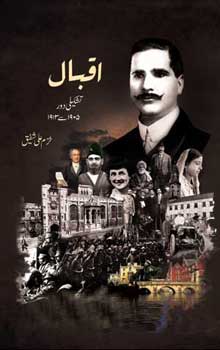The writings of Khurram Ali Shafique Iqbal - the Formative Years, 1905-13 Iqbal – Tashkeely Daur, 1905-13 is the second book in the six-volume comprehensive biography of Dr. Sir Muhammad Iqbal in Urdu. It covers the formative years in the life of the Poet-Philosopher when he traveled to Europe for higher education, outgrew the mind of Europe and discovered the secret of the collective ego ("the spirit of all human beings" as Sir Syed Ahmad Khan had called it in 1873). Apart from attempting to cover everything known about this period in Iqbal’s life, the book also presents substantial information on several related personalities of the period, including Shibli Nomani, Muhammad Ali Jauhar, Agha Hashr Kashmiri. Political and social developments which may have been of special interest to Iqbal in that period are also touched upon, especially those related to India, Afghanistan, Iran, Turkey, Libya, the Balkans, Morocco and Great Britain. This volume also offers new light on the work of Sufi masters and contains a substantial translation from The Conference of the Birds by Sheikh Fariddun Attar with some speculation about where they may lead us if we follow the path suggested by Iqbal. Such passages in the book are an attempt at reconstructing the theory of literature in line with the collective experiences of humanity as viewed by Iqbal. This attempt at discovering a new poetics is naturally connected with a fresh outlook on history as suggested in this book. More than being a series of random events, history might be an actualization of our deepest ideals contained in literature like seeds in fruit. Ultimately this deeper connection between literature and history raises some tough questions about destiny, for which this volume prepares ground. The thread which runs through the entire volume despite the seemingly fragmented narrative is the reality of the collective ego (“the spirit of all human beings”). Literature, politics, religion and education seem to be interconnected especially in Muslim societies and their relationship seems to be governed by the breath of the collective ego – perhaps discernible in the consensus of free citizens in such cases. |
Read sample from Book II. |

